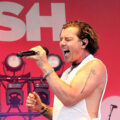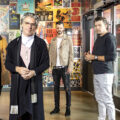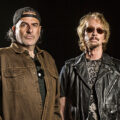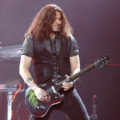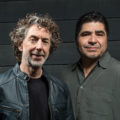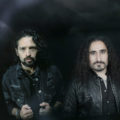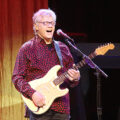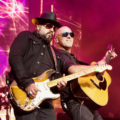Bush’s Gavin Rossdale remembers producer Steve Albini prior to Aragon for Q101 Twisted
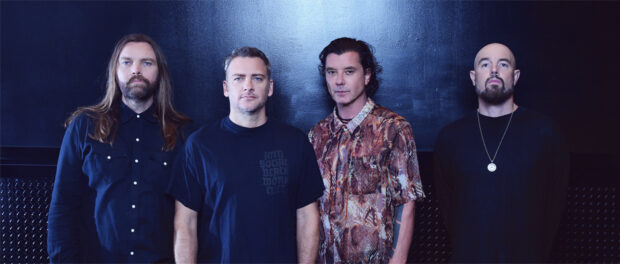 Photos provided by Shervin Lainez
Photos provided by Shervin Lainez
This Friday’s performance at the Aragon Ballroom, as part of alternative station Q101’s annual “Twisted” holiday concert series, caps a busy year in Chicago for alt-rockers Bush, who performed in February at Salt Shed and this past August along the lakefront at Huntington Bank Pavilion, with the Windy City acting as a home away from home of sorts for frontman Gavin Rossdale over the course of the last 30 years.
On stage at Northerly Island, Rossdale spoke eloquently and at length about late Chicago-based recording engineer Steve Albini, who worked with Bush on their sophomore full-length effort, “Razorblade Suitcase,” prior to its release in 1996.
Chicago Concert Reviews talked to Rossdale about returning to the Aragon 29 years later, fond memories of coming to town and his earliest moments as a fan of Albini’s.
What’s Chicago been like for you over the course of the last 30 years?
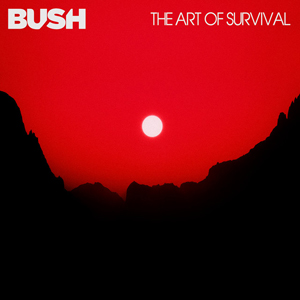 Gavin Rossdale: It’s been incredible for me. Often when you travel, the one thing that you miss is a place with friends, familiar people, familiar faces and places that you know. If you get lucky enough, there are a couple of cities where you have that.
Gavin Rossdale: It’s been incredible for me. Often when you travel, the one thing that you miss is a place with friends, familiar people, familiar faces and places that you know. If you get lucky enough, there are a couple of cities where you have that.
So, Chicago has been an amazing place for, obviously, Steve [Albini] and Heather [Whinna]. There’s a friend of mine, Grant Achatz, who has a restaurant there. I had a big dinner for my sons at Alinea, which was really incredible. We don’t take that lightly. So, those kinds of things.
I also remember, when I first came there, swimming in Lake Michigan. Nobody told me you’re not meant to. I thought it was just incredible. And I’m fine by the way! I’m living proof that you can swim there.
Better the lake than the river. It appears you’ve played the Aragon Ballroom one other time: September 1, 1995 with Hum, The Toadies and The Lupins. I can’t imagine you recall that…
Rossdale: I do have memories of it! Because my son has fallen in love with Hum. And so it’s been fun. Because, actually, I endeavored and I got a hold of Matt Talbott, the Hum singer. We had just lost touch. So, now we’re back in touch. I’m really happy about that. So, I do remember that.
I think the night before…I’d be interested to know if I’m completely mistaken. I could be nuts, but I think I saw the [Smashing] Pumpkins or somebody break there in that venue. They were playing like a couple days before us. It’s been a while! But I went there. And it was either the same time or I was there a different trip. But the Aragon – I remember the way it looks like. And I’m intrigued to know what they’ve done to it.
[Editor’s note: Soul Asylum, Matthew Sweet, Victoria Williams and the Jayhawks performed at the Aragon on August 25, 1995]
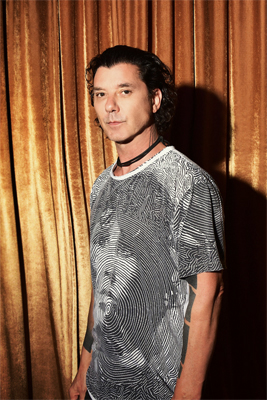 Earlier this summer, you spoke eloquently and at length on stage at Northerly Island about Steve Albini. What is it for you that stands out about Steve and makes him so unique?
Earlier this summer, you spoke eloquently and at length on stage at Northerly Island about Steve Albini. What is it for you that stands out about Steve and makes him so unique?
Rossdale: (Long pause) I think it was to do with the lack of artifice, the no suspension thing. Just zero artifice. And just strongly, inherently analytical. Just a trendsetter with a sense of purpose. But also an honor.
The one thing about Steve is that, f***, he was just hilariously brutal to everyone. But it was fun to be in his gang. He made it fun to be in his gang. But I just really enjoyed his kind of honor. I think that was what was really important.
They say you can tell your friends by their behavior through your worst times. Because you need your friends when you’re at your worst. You need your friends when you’re down. And he was really, really, really, really strong in my corner for me through the worst times that I went through – when it was kind of quiet. And so anyone speaking to me kindly? Those were very loud words. So, that kind of loyalty that he had was second to none.
There are so many different people that miss him and so many people that have their different memories of him. And we’re kind of just under his semi-jurisdiction. Like the speech Kim Deal gave at the unveiling of the street [Steve Albini Way on Belmont Avenue outside Electrical Audio]. That was a really peaceful admission of how everyone she knew was because of Steve. He was like the signal point in her life. Very, very powerful stuff.
Whether it’s the music he made in groups like Big Black or Shellac, or the albums he engineered for so many artists, what are your earliest moments there as a fan?
Rossdale: “Songs About F***ing.” It was just so fun that someone had an album title like that. “Kerosene” was like my first introduction to Big Black and then “Songs About F***ing. It was just such a wild, abrasive, interesting sound that I couldn’t get anyone to make when I was in London. I just thought it was very exciting.
Rapeman was kind of short-lived and didn’t have the same fervor. And then when Shellac landed, I think “At Action Park” it just was like… Still, honestly, my favorite live band I ever saw was watching Shellac. I saw them so many times. And something about them just satisfied everything in me that I want from music and performance.
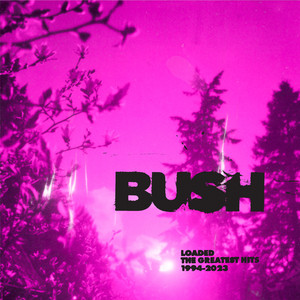 And it was wild. Because it wasn’t about going to see a collection of greatest hits. This was about going to see this energy and this attitude – this breathing animal of sound. And the way that they worked together, which, again, Steve is so very democratic between Bob [Weston] and Todd [Trainer]. Nothing like it seeing those three on stage. And all tiny gigs. I would travel everywhere to see them. I took [ex-wife/No Doubt singer] Gwen [Stefani] to Belfast!
And it was wild. Because it wasn’t about going to see a collection of greatest hits. This was about going to see this energy and this attitude – this breathing animal of sound. And the way that they worked together, which, again, Steve is so very democratic between Bob [Weston] and Todd [Trainer]. Nothing like it seeing those three on stage. And all tiny gigs. I would travel everywhere to see them. I took [ex-wife/No Doubt singer] Gwen [Stefani] to Belfast!
I’m thinking back to that 1995 Aragon show with Hum, whom Steve had also engineered by that point. A little over a year after that show, “Razorblade Suitcase” came out. Did you speak with any other artists about their experience working with Steve before you decided to work with him? How was he kind of first appearing on your radar?
Rossdale: Well, that PJ Harvey “Rid Of Me” record and all of the Jesus Lizard records. Obviously, Fugazi. But you don’t feel so connected after hearing Fugazi or the Jesus Lizard that you go, “I can work with that guy!” You just admire those records. But when I heard [the Pixies’] “Surfer Rosa,” it was really like kind of a flagpole in the direction of rock music. I grew up on punk music. And then it went away from that, like you’re meant to. I liked Psychedelic Furs, The The. Gang of Four. These kind of angular, cool bands.
But when I heard the Pixies, specifically “Surfer Rosa” – “Bone Machine” and all of that stuff – I was like, “Wow!” It was just sort of a kismet moment – thanks to their creativity. It was just really inspiring. And so that’s when I fell in love with Steve – because of that sound. And every time I made demos, I was like, “Why can’t we sound like that?”
I loved Polly’s first record, “Dry.” I got that [Fender] Jazzmaster because of her. I thought she was just so cool. And then she went off and made “Rid Of Me!” And I was just like, “Oh my god…” At the same time, I got this record of this band called Souls from Sweden. Because I was successful at the time, they let me start a label. So, I signed this band Souls. And, of course, the only record that band had was made with Steve.
So, I had all of these bands around me – in my headphones, living with me – that I was in love with. Those records were on repeat. All around. Including Souls’ “Bird Fish Or Inbetween.”
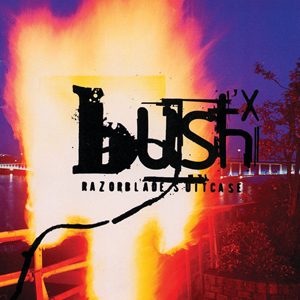 When Bush went to make the second record, [the label] kind of said, “You know, you can work with whoever you’d like…” Steve was just someone that we thought would illuminate who the band was through the recording process. Because he recorded who you were. So, we wanted a real snapshot – a flattering snapshot of course – of who we were as a band. And he was the best person for that. Because, you know, he wouldn’t let me do anything! No tracking. Very, very little tracking – mostly self-played in the moment.
When Bush went to make the second record, [the label] kind of said, “You know, you can work with whoever you’d like…” Steve was just someone that we thought would illuminate who the band was through the recording process. Because he recorded who you were. So, we wanted a real snapshot – a flattering snapshot of course – of who we were as a band. And he was the best person for that. Because, you know, he wouldn’t let me do anything! No tracking. Very, very little tracking – mostly self-played in the moment.
I remember with the string section, being like, “So, I’ll put my guide [vocal] down today, cool? I’ll sing it and then watch them with you in the control room…” And he goes, “Oh, no, no. You’re gonna sing it again probably. But, no, you play it with them.” So, all of these things that he made me do that really give this sort of energy to the songs and the way they were recorded.
To be honest, I’d always dreamed of doing some kind of atmospherics-like record with him again. And going back to Chicago. And just us going and playing. I’m lucky enough to play in such an amazing band that I’d always like Steve to record them. We don’t do enough. We record separately. It’s sort of a shame. We shouldn’t do it like that – but we do do it like that. “Start a bit here, start a bit there. Come in and do the guitars. Do the bass.” It’s all just a bit separate, even if you are playing together. And there’s nothing better then when you start [recording] a song going, “Don’t f*** it up!” But it brings something out. It brings an urgency and sort of a vitality that I think sometimes could be enhanced.
I read that prior to “Razorblade Suitcase,” you actually wanted Steve for “Sixteen Stone.” Was that actually close to happening?
Rossdale: No. I went and had lunch with him in Greektown, with him and Heather, about the prospect of working together. So, that was our first meeting.
I remember that because before I went to meet him, I met David Yow [of The Jesus Lizard] in Roskilde, at the European festival in Denmark. I had lunch with him. It was like a cafeteria and we had lunch together. I was talking to him, just getting to know him. And when I said to him, “Yeah, I’m gonna go make a record with Steve. He’s so real,” he goes, “Yeah, yeah. He’s real.” (Laughs)
I love that. That’s good. Lovely David. Lovely David Yow.
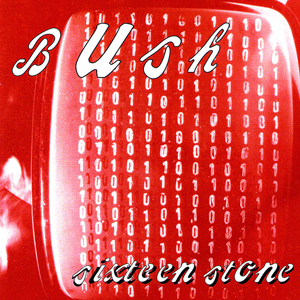 Have you been over to Electrical Audio?
Have you been over to Electrical Audio?
Rossdale: No. Not in the new spot. No. I should go over there. I’d f***ing love to. It’s annoying. When you come to town, you just hit and run. Maybe you stay overnight. It’s just annoying. Sometimes, you can be suspended from life. That was the thing that struck me when Steve passed: how much time, the things that we miss.
He asked me to come to Chicago. Because he said, “That’s where your friends are.” And I didn’t. Because I was working. You have these things in life that you regret. You go, “F***…I need to kind of heed that stuff…” Not always being kind of on the wheel of life, you know? “You’ve got to go forward!” Well, you’re only going up.
I know how hard you worked prior to Bush finally breaking through. So, by 1995, here you are not only working with Steve on “Razorblade Suitcase,” but doing so at Abbey Road Studios. How surreal was that?
Rossdale: Truly incredible. But, I think, that, if anything, I had this weird, inverted concept about it. I worked so hard. And I still work so hard to maintain it. Because nothing’s free, right? But the funny part about it was that it just felt really difficult to be on the outside for so long – and then being on the inside is just having an audience and an avenue to make records. And I felt that no one wins everyone over. I’m not Taylor Swift. So, I just liked having the opportunity to make records and to find our audience. And that felt more right to me than having an audience.
Because I was like, “Man, I remember when my first records came out…” Before Bush. And it was like, “Is this going to change the world?” “No! It’s not even going to remotely change the world!” So, it felt really good to be given the opportunity to be in the world of making music professionally.
These are strange times. And Steve was a very principled man. Sometimes, I feel like the world could use more of that today. What’s his legacy?
Rossdale: The legacy is the power of recorded music. The power of recording cultural movements – not only in Chicago, but for all of the bands that came to see him from around the world. You can’t do more than leave a legacy.
Bush performs as part of Q101 Twisted Xmas at the Byline Bank Aragon Ballroom on Friday, December 13. For additional details, visit BushOfficial.com and Q101.com.

